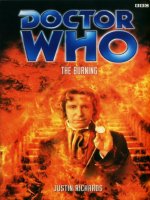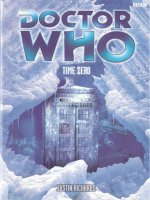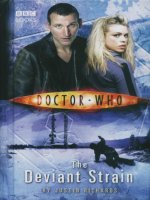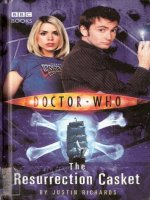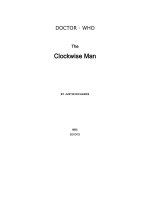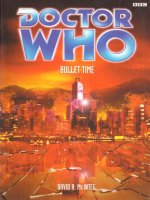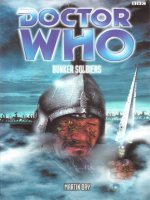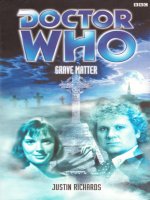English stories 31 grave matter (v1 0) justin richards
Bạn đang xem bản rút gọn của tài liệu. Xem và tải ngay bản đầy đủ của tài liệu tại đây (1012.18 KB, 236 trang )
GRAVE MATTER
JUSTIN RICHARDS
Published by BBC Worldwide Ltd,
Woodlands, 80 Wood Lane
London W12 OTT
First published 2000
Copyright © Justin Richards 2000
The moral right of the author has been asserted
Original series broadcast on the BBC
Format copyright © BBC 1963
Doctor Who and TARDIS are trademarks of the BBC
ISBN 0 563 55598 X
Imaging by Black Sheep, copyright © BBC 2000
Printed and bound in Great Britain by Mackays of Chatham
Cover printed by Belmont Press Ltd, Northampton
Contents
First Generation
Chapter One - Gathering
Second Generation
Chapter Two - Cortège
Chapter Three - Fisherman’s Ruin
Chapter Four - Anachronisms
Chapter Five - Herd Instinct
Chapter Six - Digging for Clues
Chapter Seven - Unearthing the Truth
Chapter Eight - Delivery
Chapter Nine - Material Evidence
Third Generation
Chapter Ten - Hosts
Chapter Eleven - Sheldon’s Folly
Chapter Twelve - Sacrifices
Chapter Thirteen - Close Calls
Chapter Fourteen - Under the Influence
Chapter Fifteen - Overdosage
Chapter Sixteen - Solution and Evolution
About the Author
For Alison, Julian and Christian as ever and for ever.
And for Steve, for asking me to play.
First Generation
Chapter One
Gathering
Even dead men dream. There were curtains at the window,
heavy with dust and age, stinking with decay. They were not
drawn, and the moonlight spilled on to the moth-eaten carpet
and the stained wood of the floor. He could open the window,
he had found. He could open the window and reach out into
the biting cold of the night beyond, pushing his arms between
the bars until his shoulders ached for freedom.
Like pushing his arms into the rubber sleeves. Reaching
into the dread-night of the sealed environment. Watching the
light flooding into the box as he twisted the latch.
A cloud scudded across the blotchy face of the full moon.
There was a taste of mist in the air. The salt-sea smell
permeated the room. Out of the corner of his bloodshot eye he
caught sudden sight of a tiny dot of light - a star, perhaps.
Gleaming alone in the misting sky.
In his bloodshot mind’s eye he was imagining the tiny
speck of light passing through the stellar clouds, bouncing off
the atmosphere of distant planets, grasping at even smaller
specks of material, ushering in the mists of space. His hands
clenched at the thought, grabbing at handfuls of the gathering
mist and feeling them slip through his tortured fingers. He
could feel the gaps in his left hand. He could feel the nerves
and muscles that were no longer there. He could feel them
even now twisting the catch. It was not an image he
welcomed, and he pushed harder against the bars in an effort
to break back to reality, to loose the dream and let it slip out
on to the moors.
But instead, he saw his gloved hands open the catch, lift
the lid, reach in for the contents of three-zero-seven.
‘You were right,’ he heard himself say, voice filtered by
time, by imagination. ‘It is genetic.’
And the man in the wheelchair nodded his satisfaction,
smiling as if he knew what was to come. What they had
unleashed.
He pressed harder still against the bars, so close now he
could feel the rough edges of the rusted surfaces through his
shirt.
Until he felt the bars give.
‘Another drink?’
The woman put her hand over her glass and shook her
head. She stifled a yawn.
‘You don’t mind if I do?’ He did not wait for an answer,
but refilled his own glass from the decanter. ‘Yes,’ he said,
twisting the glass slowly by its stem, allowing the firelight to
flicker on the facets of the bowl as he examined the rich, dark
liquid inside. ‘Yes, a good day’s work.’ He turned so his back
was to the fire and raised his glass in salute. His thick fingers
were a contrast to the delicate stem of the cut glass. ‘We’re
making good progress,’ he said.
The woman smiled back. She drained her glass and placed
it on a low table beside her chair. ‘I’m tired,’ she announced.
‘It’s been a long day.’
The man seemed not to hear. He walked slowly across to
the window and tweaked the curtain aside. ‘Mist’s coming in,’
he commented.
‘I think I’ll say good night.’
He turned from the window, letting the heavy curtain fall
back into place. The gaslight on the nearest wall flickered
slightly, sending shadows dancing across the man’s craggy
face, picking out the ridges and pits in his skin. ‘We’ll need
more material,’ he said quietly.
The woman stood up. ‘So soon?’ There was a depth of
weariness in her voice.
‘Tomorrow.’ His face split into a sudden smile. ‘Don’t
worry. I’ll organise it.’
Before the woman could reply, there was a knock at the
door. Urgent, loud.
‘Come,’ the man called out. He did not bother to look to
see who it was. ‘Yes, Rogers, what is it?’
The manservant was flustered. He stood in the doorway as
if nervous of entering the room fully. His hands were clasped
in front of him, shaking slightly. ‘I’m sorry, sir,’ he said, his
voice tremulous.
The man did turn now, alerted by the tone of Rogers’s
voice. ‘Well?’
‘I was taking a drink to -’ He broke off, swallowed. ‘For
the night. And of course to check that -’
‘What is it?’ The man’s face was darkening. His voice
betrayed his impatience.
‘Well, he’s gone, sir.’
‘Gone?’ the woman asked. She looked from one to the
other.
‘I’m sorry. The window.’ Rogers swallowed again. ‘The
bars...’ He opened his hands, apologetic, almost pathetic.
‘Rusted, weak...’
The woman coughed a short, nervous half-laugh. ‘But he’s
ill. We have to find him.’
‘I couldn’t agree more.’ The man pushed his half-empty
glass on to the mantel shelf as he spoke. ‘We need him.’ He
kicked a burning log back into place, sending sparks
showering across the grate. ‘And we need him in one piece.’
He turned and strode purposefully towards the door.
‘He could hurt himself.’ The woman hurried after him.
‘Hurt himself?’ There was a note of derision in the man’s
voice.
‘In his present state. He could...anything,’ she protested.
Rogers stepped aside to let the man pass. ‘The horses, sir?’
The man was already half-way down the panelled hallway
towards the front door. ‘And the dogs, Rogers,’ he called back.
He paused in a pool of light cast by a wall lamp. For a moment
he was motionless, as if composing himself. Then he turned
back, and smiled thinly at the woman. ‘Don’t worry, my dear.
You get some sleep.’ His smile hardened, as if setting in
position. ‘We’ll soon run him to earth,’ he said, his voice like
gravel.
At least he had all his toes. At the moment.
He had settled into a sort of staggering run, forever falling
forwards over the rough rocky ground, but never quite
pitching on to his face. There was enough light from the moon
seeping through the gathering mist for him to make out the
landscape. The landscape which he knew so much better than
they did. This was his landscape after all, his home.
He stumbled over an outcrop of rock, lost his balance. This
time he did fall. He lay for a moment, staring back up at the
grey-blackness. The whole sky seemed to be alive, seemed to
be moving as the fog rolled in from the sea. If he listened he
could hear the crash of the waves against the base of the cliff.
Not far now. Not far at all. And then...?
He pulled himself back to his feet, almost retching for
breath. The skeletal outline of a tree was thrusting through the
murky air beside him, and he grabbed at the nearest bonebranch for support. His thumb and single surviving finger
curled round the damp, brittle wood.
Somewhere at the back of his memory he could hear the
crack of pain as they removed his fingers. His brain was a
muzzy fog as he watched them, knowing that the pain would
follow. Soon. And then, it would happen again. And again.
The sound jerked him back to the present. The howl of a
dog somewhere out on the moor behind him. Close to the
house, perhaps. The noise was filtered and drawn out by the
fog, a mournful baying tinged with a tired sadness that made
him yearn to join in. But he knew he must keep silent. They
would pick up his scent soon enough. The hounds would be
racing over the moors, the horsemen close behind. Soon they
would find him, find him and take him...home.
He was stumbling onwards again, hoping it was not far
now. Straining to see the edge of the cliff through the nightfog.
He knew it so well, yet he almost missed it. The moorland
stopped abruptly, as if cut through by a huge serrated knife.
The ground gave way into an abyss of blackness. He teetered
on the edge, staring down. The sound of the waves crashed
through the night. All he could see was the fog swirling round
the base of the abyss, as if stirred up by the wind. As if
escaping down a large plug hole. As if drawing him into its
very heart.
The hounds were close now. He could hear their voices
calling to each other through the night. They had the scent. His
scent. His hounds.
It was only now that he knew why he had come here.
Now, as he stood staring down at the empty space where the
water was. Now, as the hounds were running. There was only
one way they would lose his scent, he knew. Only one way
out.
He turned to look back. At the same moment, the first of
the dogs appeared through the fog. It was in midair, emerging
from the gloom as it leaped towards him. He cried out despite
himself, raised his arm to ward off the snapping teeth, took a
step backwards.
For a brief moment he was poised, half on the edge, half
over it. Then the animal connected with his arm, knocking him
backwards, falling with him, tumbling head over kicking heels
into the abyss.
Before the sound of the sea and the fog swallowed him
whole.
Second Generation
Chapter Two
Cortège
The heavy air was split by a sudden scraping, a painful
wrenching. The mist seemed to be drawn to the sound,
swirling into a sudden gap. It coalesced round a single area,
solidifying slowly into shape. A square, box shape. The flash
of the lamp on top of the blue box vied with the pale sunlight,
struggling to be seen through the thickening air.
Then with a final satisfied thump and a last flash of the
light, the TARDIS became real, pushing the mist out of the
area it now occupied.
A little later the door creaked open and Peri looked
tentatively round the edge, her dark hair framing her face. She
sniffed at the misty air, wrinkling her nose up at the scent of
the sea. She was about to step back inside when she was
suddenly propelled forwards, through the doors, making way
for the Doctor to step out on to the moorland.
As Peri stumbled and struggled to regain her balance, the
Doctor drew his heavy cloak around him and took several
theatrically deep breaths. ‘Bracing!’ he announced hugely,
turning a complete circle as he looked around.
Peri hunched up inside her heavy, dark coat. Beneath it she
was wearing a thick velvet dress that reached down almost to
her ankles. But she could already feel the cold, damp air
working its way through to her bones. ‘Not very inspiring,
Doctor,’ she told him. ‘Let’s try again.’
‘It may not be inspiring to you, young lady.’ He was
already pulling the TARDIS doors closed and locking them.
He turned and set off across the uneven ground without
looking for her reaction. ‘But to the true genius, inspiration is
to be found...’ He paused as if trying to recall exactly where it
was to be found. ‘Everywhere,’ he decided expansively. He
waved both arms as wide as he could, letting his cloak open to
reveal the gaudy coat beneath.
‘Huh,’ Peri said. She hitched up her dress and ran after
him as he set off again.
The Doctor was still speaking, presumably to himself
since Peri could not hear what he was saying until she was
quite close.
‘Oh yes,’ he agreed with himself. ‘Sermons in stones,
books in the babbling brook.’ He turned towards Peri as if he
believed she had been with him the whole time. ‘Inspiration in
everything.’
‘Huh,’ Peri said again.
‘Huh,’ the Doctor mimicked back. ‘Not a very inspired
response, if you don’t mind me saying.’
Peri seriously considered saying ‘huh’ again, just to
underline the point. But as she hesitated the moment was lost
to her.
‘Earth,’ the Doctor announced. ‘Got to be.’ He took
another deep breath. ‘Need to check, of course. When running
in a new supply of Zeiton-Seven you have to recalibrate
everything. Work out where you are, so you know where
you’re going. Find out when it is, so you can tell when it will
be next. That sort of thing.’ He stopped suddenly and drew in
a deep breath of mist. ‘Mmm,’ he decided as Peri caught up
with him. ‘Taste that sea air. Cornwall, perhaps? Untainted by
the excesses of pollution anyway.’ He glared at Peri from
point-blank range. ‘So we’re not in your enlightened times.’
‘Hey,’ Peri snapped back, ‘I just live there.’
‘Huh,’ said the Doctor. Then he suddenly grinned and
nudged her with his shoulder as if sharing a deep and
meaningful joke. ‘Let’s get the time and place, and then I can
recalibrate the calibrators and we can be on our way.’
‘And why do we need to recalibrate the calibrators?’
He stopped dead in his tracks. ‘My dear Peri, that is what
they are for. You have to calibrate calibrators. Otherwise what
earthly use would they be to anyone? It’s part of the running
in, the resumption of normal service. The calibration,’ he
finished, a note of desperation creeping into his voice. He
shook his head and embarked on a series of profound ‘tuts’
and whistles.
‘Then can we go somewhere warmer once you’ve sorted
out this Zeiton-Seven stuff?’ Peri asked. ‘Somewhere I can see
more than six feet ahead of me?’
‘Six feet?’ the Doctor asked in puzzlement. ‘No, no. Just
the two of us.’ He held up his hand and raised up his fingers,
one by one. ‘That makes four feet.’
Peri, however, was staring beyond the Doctor’s fingers,
out into the mist. ‘Six feet,’ she said again. ‘You need to count
him too.’
If Peri had ever taken the time to formulate an opinion of
what the Wild Man of the Woods might look like, she would
have settled on something pretty close to the figure now
emerging from the mist in front of them. He was probably in
his mid-thirties, but it was difficult to tell as his face was
streaked with mud and dirt. His hair was matted and hung in
straggles down his face. Beneath his ragged fringe, his eyes
were alert, darting back and forth between the Doctor and Peri.
His clothes were as dirty as his face, torn and stained. His feet,
Peri could see as he shuffled towards her, were bare and caked
with earth and blood.
The Doctor was watching the man, fascinated. He still
held his hand out, fingers raised. But he had altered its
position just slightly, so that it seemed like a gesture of
welcome. In response the man raised his own left hand.
Whether this too was a greeting, it was difficult to tell.
Perhaps, Peri decided with a gulp, he wanted to show them
that he was lacking the two middle fingers. They were gone,
missing from the knuckle.
‘Hello,’ the Doctor said in the same tone as he might use
to a five-year-old. Or a puppy. ‘Now who might you be?’
Peri half expected him to lean forward and make
encouraging clicking noises with his tongue to coax the man
forward.
‘Live here,’ the man said. His voice was weak and barely
audible, as if swallowed up by the mist. ‘Home.’ He waved his
good hand, taking in the whole of the visible world.
‘Really?’ The Doctor looked round. ‘Very nice. Do you
live here alone?’
‘Alone.’ The man nodded, his hair flapping heavily round
his head. Then his eyes narrowed. ‘They want me back,’ he
said, his voice a hissing mixture of anxiety and conspiracy.
‘First generation,’ he added helpfully.
‘I see,’ the Doctor said, nodding back.
‘He’s demented,’ Peri whispered.
‘Oh nonsense,’ the Doctor said, shooing her away as he
stepped up to the man. The man shrank back in fear. ‘Now
then, my good man,’ the Doctor began.
But the man was already turning and heading back into the
mist. He paused just within sight. ‘Don’t let them get you,’ he
said. ‘Lock you up. Dogs.’
‘Thank you,’ the Doctor called after him. ‘We’ll bear that
in mind. Won’t we, Peri?’
‘Yeah,’ Peri agreed. ‘Right.’
But the man was gone.
The Doctor sighed. ‘Charming fellow,’ he said. ‘Wonder
what his name was.’
Peri laughed. ‘I doubt if he knew.’
‘That’s a little uncharitable, you know,’ the Doctor
admonished as he picked his way onward through the mist. ‘I
think it’s getting thicker, if anything,’ he commented.
‘He was barking mad,’ Peri said as she followed.
‘Yes, he did mention dogs, didn’t he?’
‘Watching too many werewolf movies if you ask me.’
The Doctor was standing still, staring out into the fog.
They could barely see a yard ahead now. ‘Well,’ he said
absently, ‘even a man who is pure of heart may lose his mind
when the wolfbane blooms.’
‘What?’ Peri stumbled past him, half turning to see what
he was on about as she went. She shook her head, deciding she
would probably never know. And her foot missed the ground.
Her first thought was that there was a dip in the earth, or a
rabbit hole. But her foot kept going and, as her centre of
gravity brought her forward, she found she was staring into the
space where the ground ought to be.
‘Peri!’ the Doctor shouted as she continued to fall
forwards. Her arms were flailing now, thrashing in air. She
continued to fall forwards until she could hear the raging of
the sea far below, could see the broken edge of the cliff.
Then a hand grabbed one of her arms, yanking her
backwards with sudden force.
‘Thanks,’ she gasped, turning towards the Doctor.
Except that it wasn’t the Doctor. It was the wild man. He
held on to her hand as they stepped back from the edge. His
eyes were shining in the watery light, intense as he stared at
her, the irises so pale they were almost white. He pulled her
even closer.
‘Thank you,’ Peri repeated, trying to pull gently away
from him. But he held on tight to her arm. Over his shoulder,
Peri could see the Doctor watching. He nodded, lips pursed in
an expression that suggested he thought she was safe.
The man leaned closer still, and Peri could smell his hot
rancid breath as he spoke. ‘Be careful,’ he hissed at her. Then
he let go of her arm and stepped away. ‘I’m sorry,’ he said, his
voice suddenly calm, strangely normal. ‘Lucidity comes and
goes, I’m afraid. A side effect perhaps.’ He blinked rapidly
several times.
‘Side effect?’ the Doctor asked.
The man nodded. Then he raised his damaged hand
again.’Or perhaps it’s trauma. Because of what they do to me.’
They all stared at the hand, at the stumps of his two fingers.
Then he clenched his hand into a sudden approximation of a
fist, a single good finger pointing through the fog. ‘The village
is that way.’ His body hunched up again, and he staggered
away. ‘They’re good people,’ his voice floated back to them.
‘They deserve better.’
‘What do you make of that?’ Peri asked as the mist
engulfed the man again.
‘Load of rubbish. Absolute nonsense,’ the Doctor said
huffily.
‘What?’
‘You can’t get better than us, no matter what they
deserve.’ The Doctor nodded, apparently happy with his
reasoning. ‘Come along, let’s find this village.’ He headed off
into the mist, Peri stumbling after him, still shaken by her near
fall.
‘Why can’t we go back to the TARDIS?’ She asked when
she caught him up. There was no reply. ‘Doctor?’
‘Well,’ the Doctor said slowly, ‘Unfortunately that nice
man was able to direct us towards the village, but didn’t tell us
which way the TARDIS is.’
Peri considered this. ‘You mean we’re lost?’
The Doctor frowned. ‘Peri,’ he said.
The mist thinned as they walked away from the sea. But
the air remained damp and cold. After a while they crossed
what seemed to be a narrow track, perhaps worn by sheep. It
led them winding and meandering across the moorland, and
brought them eventually to a rather wider track that ran
between two fields. In the distance in one of the fields, Peri
could see cows, black and white Friesians, grazing
contentedly.
They saw no evidence of farm buildings, though they
crossed several other tracks. The land became less rocky, and
the track became a cobbled path. The mist began to close in
once more, though not to the same extent as earlier on the
moor, and Peri guessed they were close to the sea again.
‘Watch out for the cliff edge,’ she told the Doctor.
‘No need,’ he answered. ‘Look.’
She looked. Through the haze she could see the masts of
several small boats, fishing boats perhaps. Peri and the Doctor
headed towards them, and found a small harbour built into an
inlet. They were all small sailing boats, most of them in a
rather dilapidated state. Several torn nets lay across the
harbour wall, perhaps in the process of being mended. The
wall itself seemed to be built mainly of flint. There was
nobody around.
‘Small fishing community,’ the Doctor said. ‘A day off,
perhaps. The fish don’t usually stop for a bit of sea mist.’
‘Perhaps it’s Sunday?’
He turned and looked across the landscape. Eventually he
pointed along the cobbled road in the direction they had been
heading anyway. ‘That way, I think.’
‘Inspired,’ Peri told him. ‘The advice of a genius.’
The Doctor glared at her. ‘It also happens to be where the
church is. And that suggests the village is there too.’
Peri peered into the distance. She could just make out a
thin, dark spike sticking up through the mist. As they walked,
it resolved itself into the spire of a small church. Sure enough,
the road led past the church and its misty graveyard and into
the village beyond. They were on a slight rise at the edge of
the village, affording them an excellent view down into the
community.
Gas lamps stood at irregular intervals along the cobbled
street. Although it was daytime, they glowed pallidly in the
mist. There seemed to be a single main street through the
village. Half-way along was a pub, its sign swinging gently in
the breeze. At the far end of the village was another large
building. A school, perhaps. There seemed to be a field fenced
off beside it.
‘Definitely a small fishing community,’ the Doctor
decided. ‘Mid-nineteenth century, would you say?’
‘Wouldn’t argue,’ Peri agreed. ‘Gas lamps, cobbled
street.’
‘Early Victorian school house,’ the Doctor added. ‘The
church is about 1480, give or take half a century, and the pub
looks older than most of the other buildings.’
‘Great,’ Peri said. ‘Let’s start there then.’
‘The church?’
‘The pub.’
The Doctor nodded. ‘All right. We should be able to get
the date and location for the price of a few drinks at any rate.’
He jigged his hand in his coat pocket, and the sound of coins
chinking together carried discordantly through the heavy air.
‘Must have something they’ll accept.’
They set off down the street, the Doctor pulling his cloak
tight about him once more and looking around with
exaggerated interest. Peri followed close behind, head down to
keep an eye on the uneven, slippery-damp cobbles. She almost
cannoned into him when he stopped abruptly.
‘Hello,’ the Doctor said quietly.
Peri looked past him. A short way in front of them, a front
door to one of the small terraced houses had opened. Standing
in the doorway was an old woman. She was small, almost
shrivelled, wrapped up well against the cold. Her breath was
an uneven, thin trail of steam that mingled with the faint mist,
swirling into the air and lost almost at once.
As they watched, another door opened. Then another. And
another. All along the street, people were stepping out on to
the thresholds of their houses, standing quiet and still as they
looked along the street. But they were not looking at the
Doctor and Peri: they were facing the other way, looking past
the pub towards the distant school.
The Doctor nodded wordlessly to Peri and they stepped to
the side of the road. There was a narrow passageway between
two of the houses and they stood in the entrance, waiting to
see what would happen.
As they waited, Peri looked at the villagers standing silent
in their doorways. Like the old woman, they were dressed for
the cold; their heavy, dark coats, augmented here and there by
mufflers and shawls, swept nearly to the ground. Something
struck Peri as odd, and it took her a minute to realise just what
it was. Past the old lady she could see a younger couple, in
their thirties, perhaps. After that a man of perhaps fifty. A
whole group had emerged from the pub and were standing,
some with drinks in their hands, watching a house on the
opposite side of the road. They seemed a mixed set of people,
men and women, young and old. Except...
‘Doctor,’ Peri said quietly, ‘Doctor, there are no children.’
‘Perhaps this isn’t for a child’s eyes,’ the Doctor
murmured back.
‘What is it? What’s going on?’
Before the Doctor could answer, another door opened. Peri
had to strain to see what was happening. The door was the
front door to the house opposite the pub. It was a good way
down the street from where the Doctor and Peri were standing,
and the remnants of the mist made it more difficult to discern
what was happening. As she watched, a group of people came
out of the house.
This was not like the group that had come out of the pub.
There was an order to this. A formality. A procession.
‘I think it’s a funeral,’ the Doctor whispered in Peri’s ear.
And even as he said it, she saw that the distant figures
were carrying a large box on their shoulders. Two men either
side of it. A coffin. The pallbearers walked slowly to the end
of the small front garden of the house, then turned into the
narrow street, starting towards the Doctor and Peri.
‘Where are they going?’ Peri asked. But even as she spoke
she knew the answer. They both turned to look at the church
behind them.
There was a figure standing at the gate to the churchyard.
A priest, his white surplice almost glowing in the misty light, a
contrast to the dark and dull clothing of those in the procession
and the other villagers. He was in his late middle age, grey and
balding. His face was lined but friendly, despite the grim
expression. His hands were clasped in front of him, holding a
book - a prayer book or Bible. He looked up as Peri turned,
and for a moment caught her eye. There was no surprise, no
inquiry, no change of expression in his face. Just a faint, slow
nod, then he turned his gaze to the approaching mourners.
The funeral procession was moving slowly, the pallbearers
taking one step at a time, the coffin rocking gently back and
forth as they did so. They were making their way up the street
now, followed by a small group of people. Two by two. A
woman in full-length black dabbed at her eyes with a
handkerchief. An older man put his arm round the woman’s
shoulder. Behind them were two young men. One stared at the
ground, while the other was looking intently, almost fiercely,
at the coffin. All were dressed in formal black too. Along the
street, heads turned slowly to follow the procession’s progress.
Beside her, Peri saw the Doctor suddenly stiffen slightly.
He too had been watching the coffin approach. But as he
turned his head a little, the Doctor straightened, staring beyond
the mourners. Peri looked to see where the Doctor’s attention
was fixed. It seemed to be a narrow passageway on the
opposite side of the street, further down from the one where
they were themselves standing.
At first, she could see nothing. Just the dark opening, the
shadows from the houses either side and the faint gleam of a
nearby gaslight, diffused through the misty daylight to give an
otherworldly glow to the scene. But as she stared, she could
see that there was someone standing there, in the shadows. A
tall, thin, silhouetted figure. Black against dark grey. It was
only when the figure moved slightly, turning as it too watched
the procession, that she could see it at all.
As the procession passed between Peri and the figure, she
lost sight of it.
The procession was level with the Doctor and Peri. The
priest was turning to lead the way along the churchyard path.
Peri and the Doctor each took an instinctive, respectful step
backwards as the coffin passed by.
Then the second of the two pallbearers on the same side as
Peri and the Doctor slipped. Peri saw it happen, as if in slow
motion. His shoulder dipped slightly as his shoe slipped on the
damp sheen of the rounded cobbles. He adjusted his grip,
seemed to regain his balance, stood upright again. But the
sudden movement, the change in weight distribution, caused
him to slip again, more severely this time.
The man collapsed suddenly, his feet sliding from under
him. The coffin tilted alarmingly, falling into the space left by
the man’s departure. The other pallbearers tried to
compensate, tried to strengthen their failing grips on the
coffin. The young man with the intent stare ran forwards,
seeing what was about to happen. But he was too late. The
coffin continued to tilt, sliding out of the grip of the other men,
crashing to the cobbled ground. It bounced on the hard surface
of the street. There was a sound of splintering wood as the
coffin landed on its edge. Then the lid lifted, jarred open by
the impact, and slid sideways.
Peri was right beside it. The gas lamp above cast its pallid
light directly into the opening, illuminating the pasty, white
face of the corpse. It was a man, not much older than Peri. The
stiff white collar of his shirt seemed to merge with the pale
skin. The face was contorted, as if in terror, or agony. Or both.
The lips rolled back from teeth gritted tight. The forehead was
lined, and the eyes - the eyes were bulging forwards as if
straining to be free of the dead sockets of the skull. The pupils
were wide, dilated, dark against pale irises.
Then abruptly Peri’s view was cut off as the lid was
pushed back into place. Instead she found herself staring at the
young man from the procession. He glared at her, his eyes a
fierce contrast to the empty gaze of the corpse, though she
seemed to see the dead man’s features echoed in his face. He
continued to stare at her as the pallbearers lifted the coffin up
again, as the Doctor gently put his arm round Peri’s shivering
shoulder and drew her close to him, as the procession
continued on its melancholy way. Only when the last of the
mourners was in the churchyard, only when the villagers had
withdrawn silent and respectful into their houses and closed
their doors behind them, only when the group from the pub
had made their solemn way back inside, did the man turn and
follow the cortege up the street and into the churchyard.
Chapter Three
Fisherman’s Ruin
They continued their walk down the cobbled street in rather
lower spirits than they had started.
‘I think you could do with a good stiff lemonade,’ the
Doctor told Peri gently.
‘Something a bit stronger than that,’ she suggested. ‘The
pub?’
‘The place to meet people.’ The Doctor nodded. ‘We’ll
just have a swift drinkie, get the date and the location, and be
on our way. A death in a small isolated society like this,
especially of a young person, can shake up the community.’
‘It shook me up,’ Peri agreed. ‘Anyway,’ she went on,
‘they won’t have lemonade, will they?’
‘Depends what you think of as lemonade.’ The Doctor
smiled, a thin attempt that was tinged with sadness. ‘Let’s see,
shall we?’
The pub, according to its faded sign, was called the Dorsill
Arms. It was perhaps half full of people. They were not
exactly in high spirits, but there was an audible buzz of
conversation as the Doctor pushed open the door and ushered
Peri inside. It was like a switch being thrown. As soon as she
crossed the threshold, all talking stopped. Silence.
There were gas lamps round the walls of the room, but
they were unlit. The only illumination came from the milky
sunlight that struggled through the smeary windows. It made
silhouettes of the figures sitting in the bar.
The Doctor stepped past Peri, apparently oblivious to the
faces turned towards them as he made his way up to the bar.
Somewhere at the back of the room a chair scraped across the
stone floor, but otherwise there was utter silence. Peri joined
the Doctor, feeling out of place and disconcerted.
